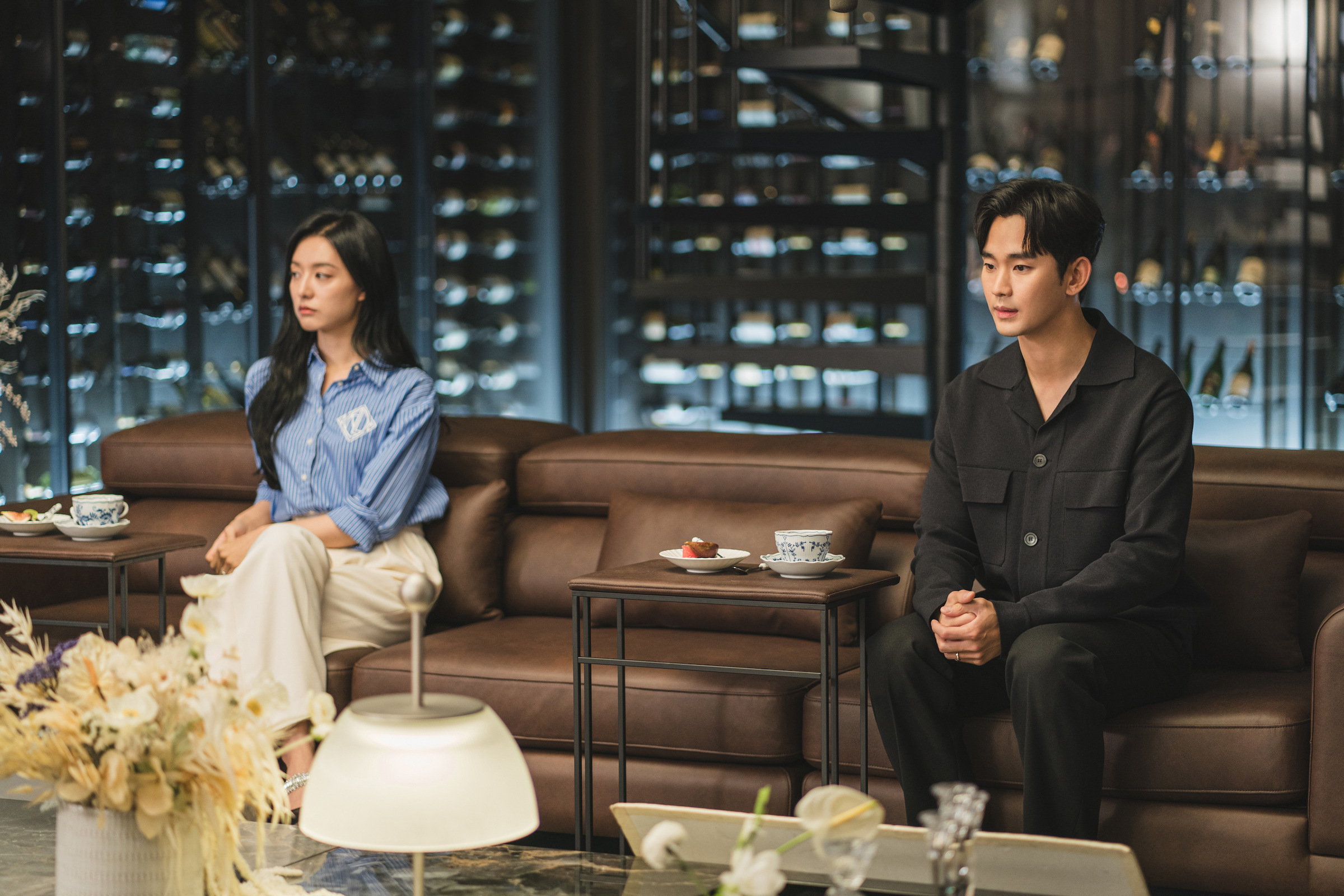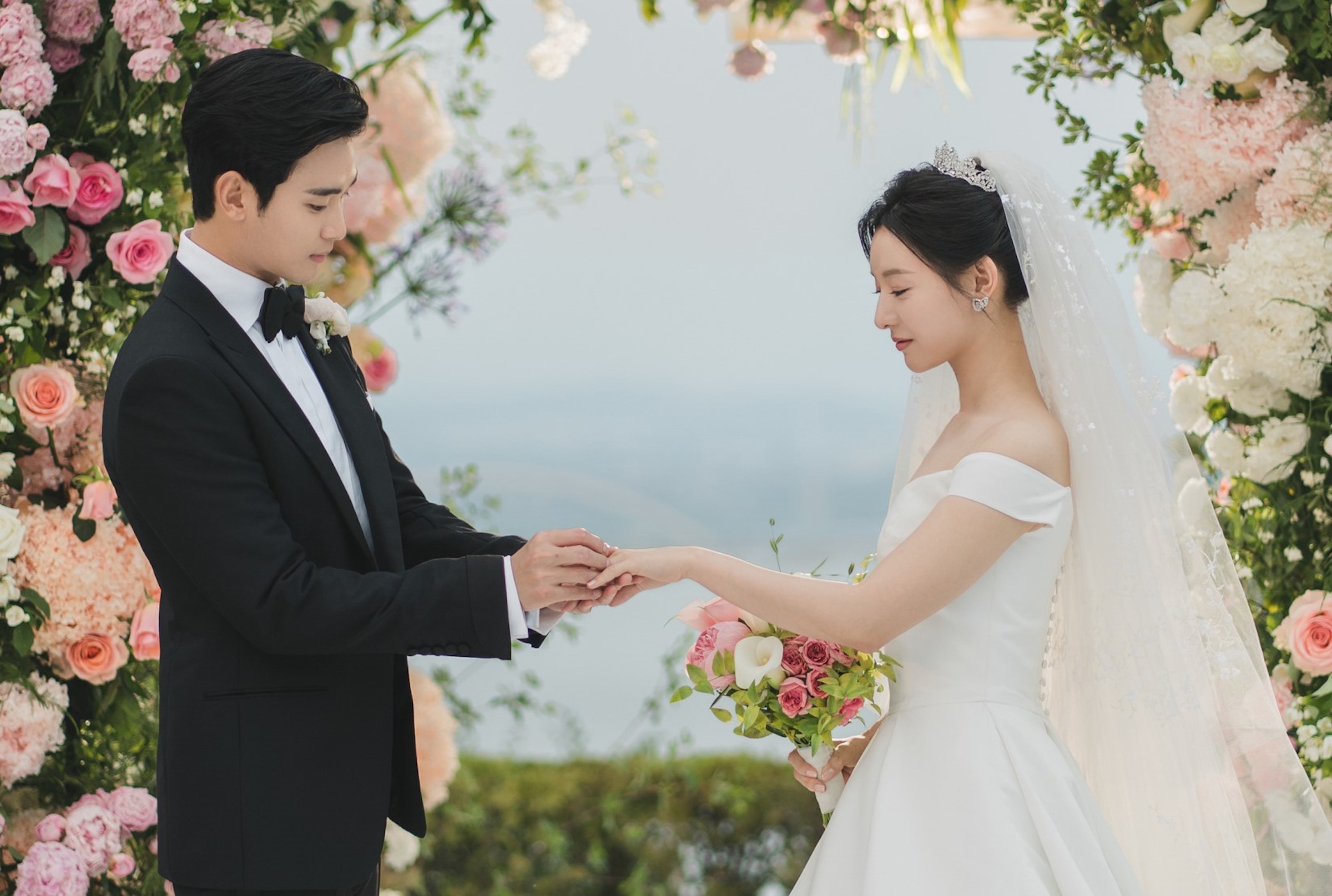Warning: This story includes light spoilers for the first six episodes of Queen of Tears.
Netflix’s latest South Korean hit, Queen of Tears, paints a familiar picture. An absurdly handsome office worker falls for a helpless intern. Without asking a single thing about her, he immediately vows to support her. It’s overbearing, it’s somewhat controlling, it’s professionally inappropriate—it’s K-drama, baby! When it is revealed that she’s the heiress to the very company for which they both work, however, he is catapulted into an idealized world of lavish riches as they marry and the two drive off into the sunset. It is the most typical of K-drama love stories, known for their unrealistic depictions of romance and bewilderingly beautiful protagonists. The most interesting thing about the way it’s wielded in Queen of Tears, which reaches its halfway point this weekend, is that it’s already happened.
We join Baek Hyun-woo (Kim Soo-hyun) three years later. The pastel haze of K-romance has disappeared, reality has set in, and Hyun-woo is drunkenly weeping about how much he hates his wife, Hong Hae-in (Kim Ji-won), who has risen from intern to Queens Group CEO. His life is limited by the rigors and scrutiny of being part of South Korea’s rich elite, combined with his perceptions of Hae-in’s prioritization of her ambition above all else. As a result, their relationship is crumbling: they sleep apart, eat apart, and ultimately lead separate lives that only briefly intersect when they fight.
The first episode of Queen of Tears puts in a lot of work to paint Hae-in, a woman who has never met a jacket she doesn’t want to drape over her shoulders, as an anhedonic workaholic, fixated on her goal of reaching one trillion won (around $7.4 billion) in sales at the department store she manages for her family’s company. For all the money, we believe that baby-faced Hyun-woo is trapped in a loveless, soul-destroying remnant of all we’ve come to expect from idealized K-drama love stories.

Read more: The Netflix Korean Dramas to Look Out for in 2024
On its own, the aftermath of the unrealistic and unhealthy relationships that permeate South Korean romances would make for a novel and compelling series. Screenwriter Park Ji-eun (best known in the west for writing Crash Landing on You), however, is just getting started.
Hyun-woo has had enough. But as he’s about to hand Hae-in divorce papers, she matter-of-factly reveals that, thanks to a rare form of brain tumor, she only has three months to live. Hyun-woo’s immediate reaction is that this is a lucky break. The wife he hates is about to bite it and leave him free and clear of messy divorce proceedings. If he can persuade her to change her will, he might even walk away with some of the fortune into which he married.
Hyun-woo sets out to fool his wife into believing he loves her, all while running interference to make sure his family doesn’t reveal his plans to divorce her. It plays, at times, like a Birdcage-style farce, one helped along by Kim Soo-hyun’s comic chops that manage mostly to transcend Netflix’s inconsistent subtitles.
Yet, as we realize that Hyun-woo may not be the victim of this situation, the comedy slowly melts away. We begin to understand that Hae-in isn’t the aloof, even hateful mirror of her family Hyun-woo claims she is. She’s not as stoic in the face of her own mortality as she seems. The brave face is a facade she erects to deal with the abusive and neglectful people in her life—be they her family, her competitors, or her husband. She has been waiting for Hyun-woo to be there for her. As his pretense begins, we see her for the vulnerable and surpassingly lonely woman she is. It’s heartbreaking, anchored by Kim Ji-won’s rare ability to shift between that shaky front and palpable fear as her symptoms worsen, bringing all the quiet vulnerability that made her so compelling in My Liberation Notes.
Now, when Hae-in’s need has never been more naked, she believes she’s finally receiving the love and support for which she has been desperate all her life. The tragedy of which is only heightened as we come to learn where it all went wrong for Hyun-woo and Hae-in (a sequence best left for viewers to experience as it unfolds onscreen). Which only makes Hyun-woo’s attempts to deceive Hae-in more reprehensible. That is, for now.

Read more: The 8 Best Korean Dramas on Netflix Right Now
Queen of Tears is a fresh and transformative take on what we’ve come to expect from K-dramas, but it is still a K-romance. What starts as an attempt to worm himself free from his marriage slowly—inevitably—sees Hyun-woo rediscover why he fell in love with Hae-in. It’s predictable, sometimes ugly, yet startlingly human.
This is where Queen of Tears stumbles on its way to K-drama perfection. Familiar clichés creep in, especially when we spend time with Hae-in’s family. In particular, it falls foul of the same mistake that haunts every series that focuses on demonstrably terrible people. Queen of Tears’ unnecessary antagonist—Hae-in’s old flame, Yoon Eun-sung (Park Sung-hoon)—becomes a caricature, forced to be so evil that he makes an often reprehensible Hyun-woo look good. The Hong family are already comically corrupt—both economically and morally. As they court Eun-sung for future ventures, and perhaps to replace Hyun-woo, he becomes a conniving, often boring, villain whose most memorable trait is a habit of asking why he can’t murder dogs. His presence seems only for the purpose of making Hyun-woo’s detestable behavior more palatable. At least, Queen of Tears suggests, he’s not an outright psychopath.
Hae-in and Hyun-woo’s story does not need a villain, nor does it need a love triangle. The series would not be hurt by Eun-sung’s absence, nor would its runtime of around 90 minutes per episode. But in a K-drama landscape that is so resistant to subversion, these overused tropes are a small price to pay for the humanistic and transformative drama that unfolds around Hyun-woo and Hae-in.
Indeed, it is exactly this familiarity that grants license for Queen of Tears’ subversion to flourish. By providing a roadmap regular K-drama viewers can recognize, the humanity of the story has room to breathe and draw both Hyun-woo and Hae-in away from the typical characterizations of male and female leads in K-dramas. In particular, to disabuse Hyun-woo of his self-absorbed and callous belief that he needn’t follow where Hae-in leads.
If there’s one thing that K-dramas do better than any other format, it’s blending genres to create fresh combinations. Queen of Tears does something like this, only instead of genres it’s mixing the familiar and the novel. The result is that Queen of Tears is a story of real love and real life wrapped in the unbelievable trappings of K-drama.
So what does the second half of the series have in store? People don’t die in K-drama land, not like this. A miracle always appears. But one can’t help but wonder if Hyun-woo and Hae-in haven’t used up their miracle in rediscovering each other. Perhaps that’s fine. It would be fitting for a series that lives up to its name and fuels the most lachrymose among us, and that has little interest in what we expect, to do away with happy endings. The difficulty in predicting where Queen of Tears is going is just one more credit toward its brilliant decision to embed within the familiar a novel, and atypical for K-dramas, sense of the unknown.
More Must-Reads from TIME
- Donald Trump Is TIME's 2024 Person of the Year
- Why We Chose Trump as Person of the Year
- Is Intermittent Fasting Good or Bad for You?
- The 100 Must-Read Books of 2024
- The 20 Best Christmas TV Episodes
- Column: If Optimism Feels Ridiculous Now, Try Hope
- The Future of Climate Action Is Trade Policy
- Merle Bombardieri Is Helping People Make the Baby Decision
Contact us at letters@time.com